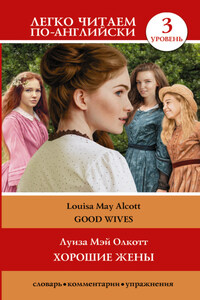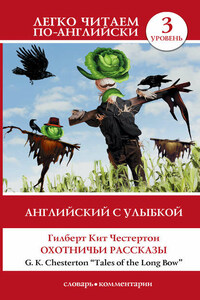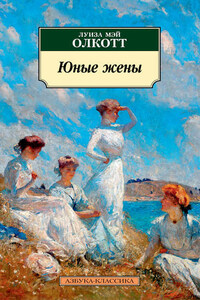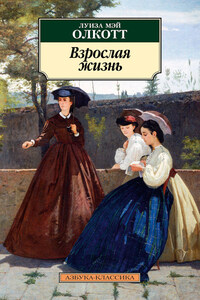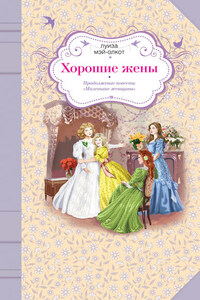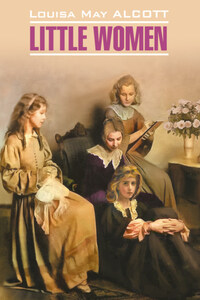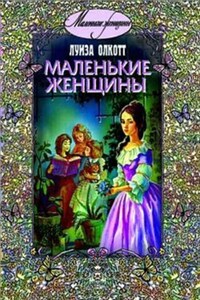The war is over. Mr. March was safely at home, busy with his books and the small parish. Poverty and the strict integrity shut him out from[1] the more worldly successes, but attracted to him many admirable persons, as naturally as sweet herbs draw bees. Earnest young men found the gray-headed scholar as young at heart as they. Sinners told their sins to the pure-hearted old man and were both rebuked and saved.
Five energetic women ruled the house, but the quiet scholar was the head of the family, the household conscience, anchor, and comforter. Mrs. March is as brisk and cheery. John Brooke did his duty manfully for a year, got wounded, was sent home, and not allowed to return. He received no stars or bars[2], but he deserved them. He was preparing for business, and earning a home for Meg. With the good sense and sturdy independence that characterized him, he accepted the place of bookkeeper.
Now we can talk about four March sisters. Margaret “Meg” March, the oldest sister, was growing womanly in character, wise in housewifely arts. She had her girlish ambitions and hopes. Ned Moffat married Sallie Gardiner, and Meg was contrasting their fine house and carriage, many gifts, and splendid outfit with her own. She was secretly wishing to have the same.
What about other girls? Amy Curtis March, the youngest sister, gave her mornings to duty, her afternoons to pleasure, and prospered finely.
Josephine “Jo” March meantime devoted herself to literature and Beth, who remained delicate after the fever. As long as “The Spread Eagle[3]” paid Jo a dollar a column for her ‘rubbish’, as she called it, Jo felt herself a woman of means[4].
Elizabeth “Beth” March is kind, gentle, sweet, shy, quiet, honest and musical. She is the shyest March sister and the pianist of the family. Moreover, she is the peacemaker of the family and gently scolds her sisters when they argue.
We will mention Laurie as well. Laurie went to college to please his grandfather, and now was trying to please himself. Of course he frolicked and flirted, was dandified, aquatic, sentimental, or gymnastic, as college fashions ordained, talked slang. But he always managed to save himself by frank confession, honorable atonement, or the irresistible power of persuasion which he possessed.
Now we can talk about the ‘Dovecote’. That was the name of the little brown house. Mr. Brooke prepared it for Meg’s first home. It was a tiny house, with a little garden behind and a lawn. Here Meg meant to have a fountain, shrubbery, and a profusion of lovely flowers. There were no marble tables, long mirrors, or lace curtains in the little parlor.
“Are you satisfied? Does it seem like home? Will you be happy here?” asked Mrs. March, as she and her daughter went through the new kingdom.
“Yes, Mother, perfectly satisfied, thanks to you all, and so happy that I can’t talk about it,” answered Meg.
“What about a servant or two?” asked Amy. She went out of the parlor.
“Mother and I talked about that. There will be little work here,” answered Meg tranquilly.
“Sallie Moffat has four servants,” began Amy.
“If Meg has four, the house won’t hold them,” said Jo.
“Sallie isn’t a poor man’s wife. Meg and John begin humbly,” said Mrs. March.
“Yes, Mother. Do you know I like this room most of all in my baby house,” added Meg, a minute after, as they went upstairs and she looked into her well-stored linen closet[5].
Beth was there. She was laying the snowy piles smoothly on the shelves.
“This is a setout that will last me all my days.” Meg looked quite contented.
A tall, broad-shouldered young fellow came down the road, walked over the low fence. It was Laurie.
“Here I am, Mother! This is for Mrs. John Brooke, with congratulations and compliments. Bless you, Beth! What a spectacle you are, Jo. Amy, you are too handsome for a single lady.”
As Laurie spoke, he delivered a brown paper parcel to Meg, pulled Beth’s hair ribbon, and stared at Jo’s big pinafore. Everyone began to talk.
“Where is John?” asked Meg anxiously.
“Stopped to get the license[6] for tomorrow, ma’am.”
“Who won the last match, Teddy?” inquired Jo.
“We won, of course.”
“How is the lovely Miss Randal?” asked Amy with a significant smile.
“More cruel than ever.”
“Undo the bundle, Meg,” said Beth.
“It’s a useful thing in case of fire or thieves,” observed Laurie, as a watchman’s rattle[7] appeared, amid the laughter of the girls.
“When will you grow up, Laurie?” asked Meg in a matronly tone.
“I’m doing my best, ma’am,” responded the young gentleman, whose head was about level with the little chandelier. “Listen, Jo, you’ll marry next.”
